- Home
- Trevor Hoyle
Last Gasp Page 10
Last Gasp Read online
Page 10
Who could say? Conceivably a catastrophe of global proportions— not that the authorities seemed concerned one way or the other. Besides, this was a political, not a scientific, decision. The party chose only to listen to those who raised no objection to the scheme, and not being one of them, Boris Stanovnik found himself out of favor, his section whittled down to next to nothing, and his work spied on by a little sewer rat with bad breath who bit his nails.
When Nina had finished packing she prepared a meal, which they ate in the living room, this being the warmest place.
“Will Theo Detrick be there?” she asked him as they were finishing off their meal with syrniki—little fried cheesecakes—and drinking their tea.
“I’ve no idea,” Boris replied. “It must be five years since I heard from him. He was in the Pacific at the time, still working on his precious diatoms.”
“Such a pity you lost touch,” Nina said sadly. “We could have visited him again; those six months in America were wonderful.”
“Things have changed in fifteen years,” Boris said grimly.
“Well, of course, dear ...”
“I meant here.”
“Oh,” Nina said quietly. “Yes.”
In those days, Boris reflected, he had been permitted to take his wife with him. Today he was allowed out of the country only if Nina stayed behind. In that sense he was fortunate: Scientists without close family ties never got the chance to travel abroad because the risk of defection was considered too great.
No doubt Malankov, he thought sardonically, had kept his masters fully informed as to Boris Stanovnik’s political loyalty and the extent to which he could be trusted. Not that he had ever seriously considered defecting. America was a marvelous place to visit but he wouldn’t want to live there.
Had his suspicions required confirmation, they received the official heavy stamp the next day at the airport. He was taken aside into a private interview room by two anonymous officials in drab suits, who examined every item in his luggage, paying especially close attention to the harmless contents of his briefcase.
“Where are you staying in Geneva?” asked one of them, a ferret-faced young man who despite his shabby appearance wore an expensive-looking digital wristwatch. He was out of the same mold as Malankov, one of an endless and identical series dedicated to serving the twin deities of party and state.
“Do you mean to say you don’t know?” Boris inquired with mock surprise. But neither man, it transpired, had been issued with a sense of humor. Boris altered his expression and told them what they wanted to know in a sober voice. Play the game, he cautioned himself. Everything you say, no matter how frivolous, will be taken seriously and noted down in the file.
“You’re to make a speech in Geneva,” the young man said, sorting through the contents of the briefcase spread out on the table. “I don’t see the text. Where is it?”
Boris pointed to a large leather-bound ring binder, a present from Nina. “Those are my notes. I don’t prepare a set speech. I prefer to speak spontaneously,” he said.
“But to the point, I trust,” said the other man with a faint, cold smile. “Certain people will be listening and every word will be recorded.”
“I’m flattered,” Boris said with a perfectly straight face. What were they expecting him to do—denounce the Kremlin in public? “May I put my things away now?”
The young man straightened up and thrust his hands into the crumpled pockets of his suit, watching him without expression. “Have a pleasant stay in Geneva,” he said, “and don’t forget to bring back a present for your wife.”
From his seat one over from the window Theo Detrick looked out at the huge streaked cowling of the inboard 22,000-horsepower engine of the Pan Am Boeing. The engine was slightly ahead of him, so he couldn’t see the gaping turbofan mouth gulping in rarefied air 35,000 feet above Greenland. But he knew that every minute of the flight this one engine consumed thirty-four pounds of oxygen, which multiplied by four meant that the aircraft used up thirty-nine tons of oxygen every time it crossed the Atlantic.
He couldn’t begin to guess at the number of flights on the transatlantic route. And God knew how many other private, commercial, and military aircraft were flying every hour of the day and night. Add them all together and it amounted to a global oxygen loss of millions of tons every twenty-four hours.
And that in itself was only a tiny proportion. Man was greedily consuming more and more oxygen in his industrial plants, his power stations, his home furnaces, his automobiles—every form of combustion destroying oxygen in quantities that the natural cycle of the biosphere wasn’t designed to cope with, nor was able to replenish.
There was also—and this a thought never far away from Theo’s mind these days—the world population of 5.5 billion human beings, each one needing seven pounds of oxygen every day to stay alive. By the year 2000 there would be an estimated 6.25 billion people inhabiting the planet; the question was, would there be any air left for them to breathe?
And those cretins in Washington couldn’t see—refused to admit?— there was a problem. Were they mad, or was he?
In the window seat next to his, Cheryl leaned forward, blocking his view. Resisting the impulse to touch her hand, Theo asked instead, “You’re not regretting this, are you?”
“Not so far,” Cheryl answered briefly. She spared him a cool glance and turned away, a shaft of pure sunlight gilding her razored cap of hair and snub-nosed profile.
He had no right to expect anything more. All those years of absence and neglect couldn’t be simply wiped away by the promise of a week in Geneva. He remembered his resolve, not to rush her into a kind of false intimacy that would embarrass them both. No, if any real affection was still there it would have to evolve naturally, unforced, at its own pace. It came as a shock that for years he had experienced not a twinge of guilt, and now to discover that it was his strongest emotion.
He said diffidently, “This trip will be useful to you. You’ll meet other marine biologists and people with different views, be able to get involved in seminars and debates—” Then hastily reconsidered and thought it wise to add, “Of course, for you, I want it mainly to be a vacation.”
Still not looking at him, Cheryl said, “I thought maybe you’d invited me along to take notes. Work comes first, doesn’t it? And second. And third.”
“Yes, my work is important to me,” Theo acknowledged soberly. “But it is also important to me that you are interested—that you believe in what I am doing—that is, I hope—” He was fumbling for the words and making a mess of it. He looked down at his hands, gnarled mahogany. “I wanted you to be with me because ...”
The truth was he didn’t know himself what the reason was. He suspected it had something to do with a need to find understanding. Sympathy. Affection? One person in all the world who might believe in him. Strength and belief failed and withered with the passing years, while the popular myth was that they grew strong, became deep-rooted, like a sturdy tree. Not true. A damnable lie. Alone on his island Theo had cheated time, but here and now, with his daughter beside him, the weight of age and failure pressed heavily.
Cheryl shook her head, looking out of the window. “You don’t have to explain. If I wanted reasons I’d have asked for them. I’m here. Let’s leave it at that.”
Theo found a smile. “If nothing else, you’re an independent young woman.” He meant it as a compliment, but it was a day when he could say nothing right.
“Yes,” Cheryl said. “I’ve had plenty of practice. I get along fine, thanks, and I always have.”
Theo shifted uncomfortably, his broad torso hampered by the narrow seat, and decided wisely to abandon this pretense at conversation.
In the scratched and battered briefcase between his legs rested the paper he was to read at the conference. It was a summation of all his years of research and thought, worked on and sweated over during the past three weeks until he had pared it down to eleven double-spaced typed pages. M
ore a predictive document than a list of facts and figures, he had given it the title “Back to the Precambrian,” a reference to the time on earth, more than 2.5 billion years ago, when the atmosphere was composed of hydrogen, methane, and ammonia and no free oxygen, a time to which he believed the earth was returning. The scenario was his own, and it was chilling.
Theo dozed while Cheryl stayed awake and smoked more than was good for her.
She felt confused and vulnerable. To say the least it had been a shock when her father turned up unannounced at Scripps less than a week ago. The shock turned into bewilderment when he produced two airline tickets. She couldn’t actually remember accepting his invitation (had there been an invitation?) or even having time to regret it. Events had taken charge.
As fate or circumstance or whatever would have it, she had ten days before the Melville sailed on its next research voyage, this time to Guadalupe Island off Mexico. There had been no obstacle, no reason why she shouldn’t go. And so here she was.
Traveling with the spin of the earth, they saw dusk come upon them with the dramatic abruptness of a thundercloud. After passing over the northernmost tip of Scotland, the aircraft began to lose altitude in preparation for the long descent into European airspace. To one fitfully dozing passenger the muffled shriek of engines sounded like the howl of a greedy machine sucking the breath from his lungs.
Chase was the recipient of a beaming smile from the stewardess as he stepped from the Euro airbus—blatant enough for Nick Power to remark as they went down the gangway, “Didn’t I tell you, Gav? We can’t go wrong. Check in at the hotel, a shower and change and into the bar. It’s bound to be crawling with sexy young environmentalists just burning to release all that pent-up frustration!”
“What about the conference?”
“What conference?” Nick said.
They passed through Customs and joined a line of delegates awaiting transportation. To Chase’s dismay they seemed a staid, almost dour bunch, and he counted himself lucky to have Nick for company, even though Nick’s thoughts all ran on the same track.
It was his first visit to Geneva and his preconceptions that it would be clean, somewhat austere, and filled with the new all-purpose breed of European technocrat seemed depressingly close to the mark.
They were booked into the Inter-Continental, a fifteen-minute drive from Cointrin Airport, which conveniently enough was also the conference center. In the wide carpeted lobby a board with multicolored plexiglass letters gave the conference itinerary, with details and locations of the various speakers and their subjects.
Chase paused to scan the board, and his spirits sank. This was heavy stuff.
GLOBAL ENVIRONMENTAL MONITORING: Dr. J. N. Ryman
HAZARDS OF TOXIC WASTE: Prof. I. V. Okita
DEMOGRAPHIC PATTERNS IN THE YEAR 2000: Prof. T. D. Smith
THE CARBON DIOXIDE CONUNDRUM: P. Straube
THE REYKJAVIK IMPERATIVE REVISED: Dr. P. L. Neuman
Now what the hell did that mean?
OZONE—A VANISHING PROBLEM?: Prof. C. Hewlett
WHERE IS SCIENCE TAKING US?: Dr. E. B. Salem
Where indeed? The list was long and Chase didn’t come to the name he was looking for until near the end.
MICROORGANISMS AND CLIMATE: Prof. B. V. Stanovnik
Suitably noncommittal, Chase reckoned, for a paper from a Russian scientist. He saw that Stanovnik was down to speak on the Tuesday morning—three days from now. Perhaps he’d have the opportunity of having a word with him before then. Sir Fred had mentioned that he spoke good English, which was fortunate. Chase didn’t relish the idea of conversing via an interpreter, especially a Russian one.
The hotel—“Holiday Inn with Hiltonian pretensions,” according to Nick—was teeming with people, and after unpacking and tidying up they headed straight for the main bar, which was rife with what Chase took to be the well-heeled intercontinental jet set, easily identified by their four-inch gold-tipped cigarettes, wraparound suntans, and bored expressions. They made an uneasy mixture alongside the conservatively suited conference delegates with plastic name tags on their lapels. The atmosphere was one of forced conviviality, with everyone busily consuming predinner drinks.
The contrast struck him at once, and amused him: two groups of people pursuing diametrically opposed goals thrust together, cheek by talcumed and cologned jowl.
On one side the rabid consumers, whose purpose—indeed, entire existence—was dedicated to gobbling up as much of the world’s resources as was humanly possible in a single lifetime, without a single stray thought as to the consequences. On the other the committed ecologists and environmental scientists, appalled at the wanton squandering of those resources and passionately concerned about the capacity of the planet to cope with selfish, unbridled greed, and just as determined to conserve as much as they could for future generations.
Thus the global dichotomy was displayed in front of his eyes: humanity’s two dominant and opposing impulses seen at their crudest—consumption versus conservation.
Nick sucked in a breath and crouched, his head seeming to retract into his shoulders. “Oh, Christ, no ...”
Through the bar-dwellers Chase glimpsed a narrow bald head and small close-set eyes. In his usual tweed jacket and baggy flannel trousers Ivor Banting was talking to a large bull-necked man with shorn graying hair.
“Has he spotted us?” Nick asked tremulously. “I had to put up with the bastard at Hailey Bay, I’ll be damned if I’m going to here.” Banting would have looked shifty at a children’s party, thought Chase. “I never expected to see him here,” he said, turning to face the other way. “Would you have said Banting the Terrible was all that interested in the future of the environment?”
Nick was scathing. “He bloodywell isn’t. A week in Geneva at somebody else’s expense. A fucking freeloader.”
Chase looked down on him with a flinty grin. “Like us, you mean?”
“He’s an arse-licker,” Nick insisted. “Why do you suppose he was so accommodating to the Yanks?”
“You tell me.”
“Because they’ve got the funds to underwrite big research projects, dummy, that’s why. Banting keeps in with the guys with the bucks. He couldn’t give a damn who they are and what the project is providing they’re willing to cough up—” He glanced furtively over his shoulder. “He hasn’t seen us, has he?”
“What makes you think he’s all that keen to meet us two?” Chase said. “You never know, he’s probably as anxious to avoid—” But he wasn’t and Chase was mistaken, for he saw Professor Banting excuse himself, pat the broad shoulder of the man he was talking to, and push his way toward them through the crowd.
Nick swore under his breath and threw back his drink in one quick gulp.
They shook hands, Nick with barely concealed bad grace, and Banting gestured around, nodding with a knowledgeable air. “Some excellent people here, best up to now. I’m looking forward to it, aren’t you? Have you seen the agenda?”
Chase said he had. “Anyone you’d recommend?”
“Straube and Ryman, and Colin Hewlett’s paper should be worth hearing—I was his tutor at Loughborough, you know. And Stanovnik and Professor Okita; all top-notch chaps. I’ve been to the last two conferences, in Iceland and Miami, and this looks like the best so far.”
“What’s that?” Nick said, peering intently at Banting’s lapel badge, which unlike the others was printed not typewritten and mounted in a thin silver frame. In the bottom left-hand corner was the tiny embossed emblem of a silver conch shell.
“I’m a sponsored delegate,” Banting explained. “The JEG Corporation. They’re very much concerned with environmental matters.”
“American?”
Banting nodded. “But their interests are worldwide. Electronics, chemicals, timber, aerospace. A very large organization with dozens of subsidiaries.”
Nick’s expression remained deadpan, which was eloquent enough in itself.
Chase compresse
d a smile. “So you think Stanovnik should be worth listening to?”
“It’s always worthwhile to find out what the Soviets are up to,” Banting said. He nodded toward the bar. “That’s the chap I was with a moment ago. Friendly type, not a bit tight-lipped like most of his colleagues.”
“That was Stanovnik?” Chase said, craning to see, but the big Russian had gone. Random factors accreting around a common center. He had the peculiar feeling that he was on the edge of something, as if hints and clues were buzzing all around and he couldn’t quite grasp them and shape them into a coherent whole.
One dead Russian scientist mouthing the name of another.
The leader of the British team, instrumental in killing the first before he could talk to the second.
The involvement of the U.S. military and a giant American corporation.
Carbon dioxide absorption in seawater and Stanovnik’s lecture on microorganisms and climate.
Did the pieces fit, and if so, how? Chase felt intrigued, and, why he didn’t know, strangely excited. He nodded abstractedly at something Banting was saying, and then heard Nick’s groan, undisguised and deeply felt.
Chase had just accepted Banting’s invitation that the three of them should dine together, a sort of British Antarctic Expedition reunion.
In common with the 1,752 other people in the hall, Chase hadn’t a clue what the rumpus was about.
Scheduled to start at three o’clock—it was now ten after—on the Sunday afternoon, this first session was billed in the program as' “Welcome to the Sixth International Conference, followed by a Symposium of Views.” A cozy get-together, he had imagined, to ease everyone as painlessly as possible into the rigors of the week ahead. Like everyone else he hadn’t been prepared for the commotion down there by the steps leading up to the platform.

 Vail
Vail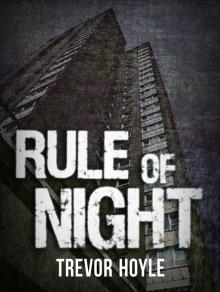 Rule of Night
Rule of Night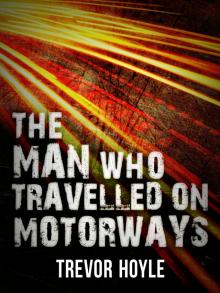 The Man Who Travelled on Motorways
The Man Who Travelled on Motorways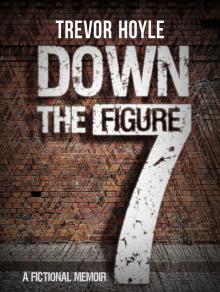 Down the Figure 7
Down the Figure 7 The Gods Look Down
The Gods Look Down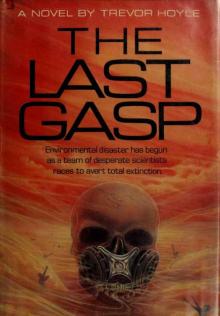 Last Gasp
Last Gasp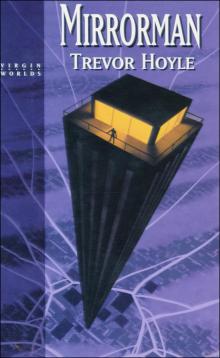 Mirrorman
Mirrorman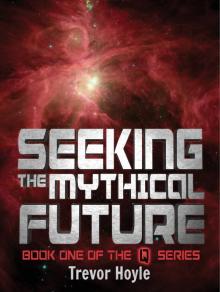 Seeking the Mythical Future
Seeking the Mythical Future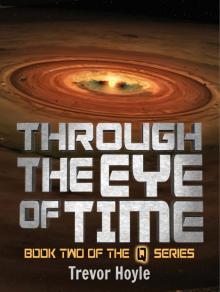 Through the Eye of Time
Through the Eye of Time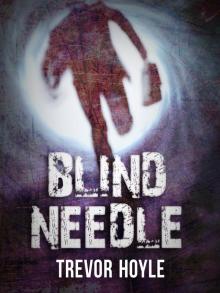 Blind Needle
Blind Needle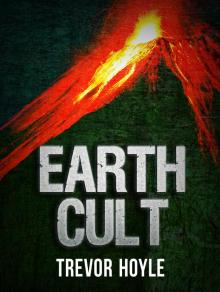 Earth Cult
Earth Cult